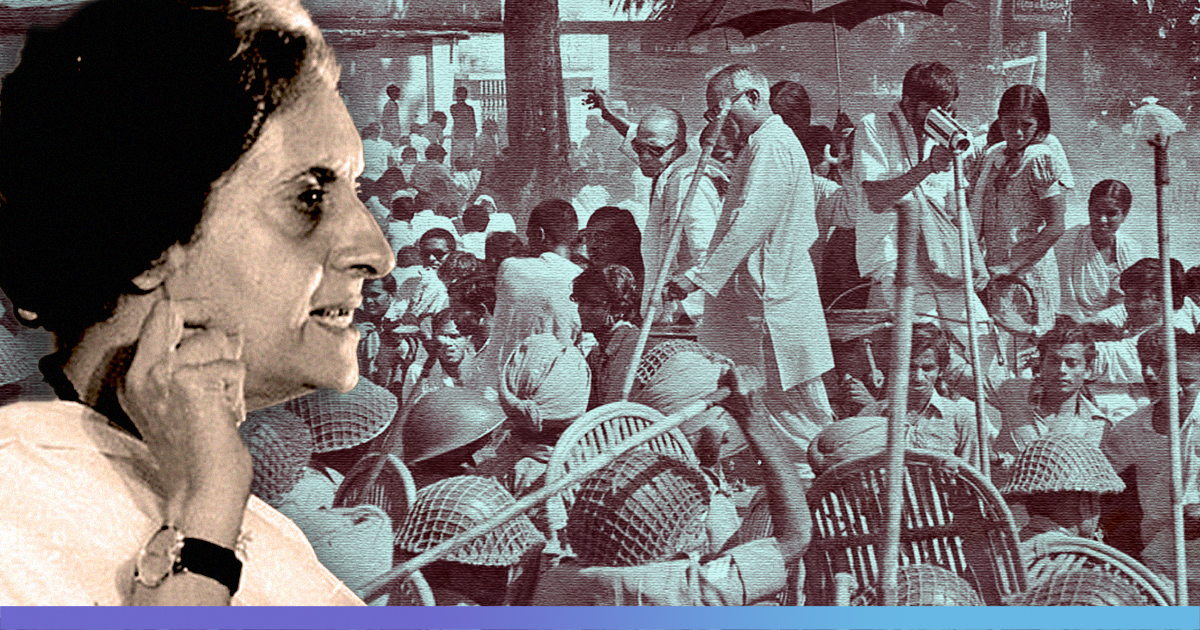During the early 1970s, political unrest against the Indira Gandhi led government was on its peak. The Congress till date was grappling to fill the void first created after Nehru’s death in 1964 and again after the death of Lal Bahadur Shashtri, India’s second Prime Miniter, in 1966.
Top leaders in the Congress were not happy with the leadership of Indira Gandhi. Amidst growing conflicts between Congress leaders, the Congress party split into two factions in 1969: Congress (I) led by Indira Gandhi herself; Indian National Congress (Organisation), first led by K Kamaraj and later by Morarji Desai. After the split, 446 of 705 congress members chose to side with Indira Gandhi.
Later in 1971, despite the split, Indira Gandhi fought the Lok Sabha elections with the slogan ‘Garibi Hatao’ and won it. Later that year, after India’s victory against Pakistan resulting in Bangladesh’s Independence, Indira gathered praises from across parties, including the opposition.
At the same time, 1973 ‘oil-crisis’ fueled inflation and resulted in increasing unemployment. Later in 1974, protests against an increase in canteen prices in Gujarat turned violent after protesters were attacked by the police. Soon the protest against rising corruption in government services, food scarcity and unemployment engulfed the state and led to the resignation of the Gujarat government in 1974.
The same year, in 1974, a similar movement was gathering pace against the Indira Gandhi government, which later gained additional momentum after a veteran freedom-fighter Jayaprakash Narayan (known as JP) abandoned social work to re-enter politics. Disgusted by the corruption, he joined politics to restore public life and the values of the national movement.
Bihar, in 1974, saw a series of protest including a protest in Gaya, where the police fired on unarmed people, and during another protest in Patna, the police lathi-charged on protesters including Jayaprakash Narayan.
The protests grew louder after the Allahabad High Court, on June 12, 1975, ruled that Mrs Gandhi was guilty of electoral malpractice. The call for her resignation emboldened, but instead of her resignation, what people got in return from the government was an eighteen-months long period of Emergency on the nation. Civil liberties were suspended, media was censored, state and parliamentary elections were postponed, and anyone who wrote or spoke against the Government was put behind bars, including several opposition leaders.
June 1975 Allahabad High Court Verdict
In the 1971 Parliamentary elections, Indira Gandhi defeated Raj Narain from the Rae Bareli constituency. Subsequently, Raj Narain filed a petition In the Allahabad High Court accusing Indira Gandhi of electoral malpractices, bribing voters and misuse of the government machinery.
Indira Gandhi was also cross-examined in the High Court which was the first such instance for an Indian Prime Minister.
On 12 June 1975, Justice Jagmohanlal Sinha found the prime minister guilty of misuse of government machinery during her election campaign and declared her election null and void and also barred her from contesting any election for the next six years. The court, however, gave the Congress twenty days to make arrangements to replace Indira as the PM. A leading newspaper described it as ‘firing the Prime Minister for a traffic ticket’.
Indira Gandhi challenged this verdict in the Supreme Court. On June 24, the Supreme Court granted her a partial stay on the High Court order – till her appeal was decided, she could remain an MP but could not take part in the proceedings of the Lok Sabha.
Excesses during the Emergency
The government made blatant and extensive use of its power to put its opponents under preventive detention. People were arrested and detained on the apprehension that they may commit an offence. Negating the judgment of several High Courts, the Supreme Court in April 1976 gave a judgment upholding the constitutional validity of such detentions during the emergency. The Shah Commission estimated that nearly 1,11,000 people were arrested under preventive detention laws. Torture in police custody and custodial deaths also occurred during Emergency.
Sanjay Gandhi, the Prime Minister’s younger son, did not hold any official position at the time. Yet, he gained control over the administration and allegedly interfered in the functioning of the government. His role in the forced sterilisation in Delhi became very controversial.
The Constitution was amended in an autocratic manner as the government enjoyed a huge majority in parliament. The most controversial one was the 42nd amendment, which stripped the Supreme Court of most of its power. In the background of the Allahabad High Court verdict, an amendment was made declaring that elections of Prime Minister, President and Vice-President could not be challenged in the Court.
Acts of dissent and resistance did happen during the emergency but were few. Newspapers like the Indian Express and the Statesman protested against censorship by leaving blank spaces for the news items that were censored.
Also Read: 40 Years Since The Emergency: The Darkest Days Of Independent India










